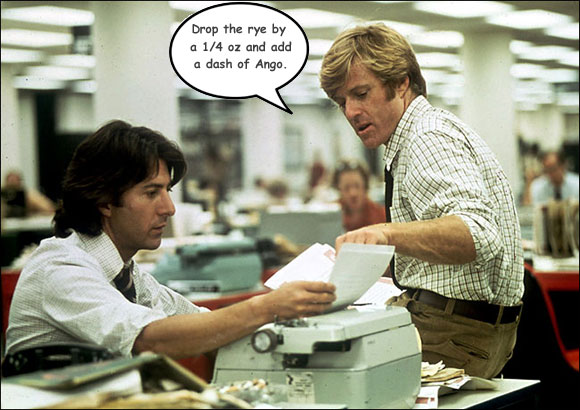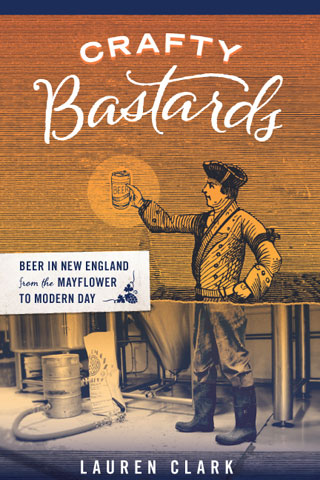August 19th, 2010
The cocktail editor
I’ve hit a wall — a wall of cocktails. No, I haven’t had too much to drink (the night is young). Rather, I can’t decide what to drink in the first place. There are too many cocktails out there. This is a fabulous problem.
Talented bartenders around the city are in a spasm of creativity. When they’re not creating new cocktails for their oft-rotating menus or to satisfy their individual customers’ nightly whims, they’re whipping up new recipes for liquor brand-sponsored contests and promotions. (And as we know, more and more bartenders are going further, moonlighting as mixologists for spirits companies.) At the same time, they’re continually digging old cocktails out of obscurity as re-printings of vintage bartending manuals proliferate.
Hence, I can always order something I’ve never had before at a half-dozen or more bars around town. What I end up with is usually pretty satisfying. But is it memorable? This is where I hit that proverbial wall. Either I don’t give enough cocktails a chance to cast a spell over my senses, or not enough cocktails are that magical in the first place.
I’m not going to get all Bernard DeVoto and say that there are only two cocktails, a slug of whiskey and a Martini (although those are on my desert island list). I’m saying that, like writing or filmmaking, cocktailing — both production and consumption — needs a little editing. Or sometimes a lot of editing.
And different kinds of editing, too. Think of a bar as a publishing house. There are the acquisitions editors, who curate the recipes according to the house philosophy and the season. There are the content editors, who pick apart a recipe, try different proportions, add a barspoon of this or a twist of that, and form it into a workable draft. There are the copyeditors, who refine things further by suggesting perhaps a different brand of gin or a flamed peel. And there are the proofreaders, who notice mistakes like a lipstick-stained glass or wilted mint.
The wrinkle, of course, is that the bartender has to fill most if not all these roles. The customer generally works in the proofreading department but sometimes takes on some copy and content editing, depending on his knowledge of cocktails and rapport with the bartender.
Customers have to be their own editors, too. If you, like me, have hit a cocktail wall, maybe you need to pare down a bit. Stick with, say, 10 different cocktails and get to know them over the course of a year. Choose depth over variety. After that period, you might have acquired enough wisdom, palate-wise, to quote Samuel Johnson to an up-and-comer behind the bar who just served you his fourth new creation of the evening: “Read your own compositions, and when you meet a passage which you think is particularly fine, strike it out.”
Permalink | Filed under Cocktails | Tags: editing, mixology, technique


August 20th, 2010 at 12:39 pm
“The stories are better than the drinks themselves.” -John Gertsen
I often wonder if a new cocktail I order off a menu here in Boston is ever going to have a story. It’s tempting to think that the rise of bespoke cocktails might create a situation where drinks have a more transient life than they had in the past. Something gets improvised on a Friday, and no matter how inventive and delicious it was, it’s forgotten by Saturday. But even a drink that’s been toiled over night after night by a bartender until it achieves a perfect balance of flavors, or a drink that’s been designed by a seasoned team of brand representatives and focus group tested to a point of optimum appeal, these drinks are left up to the same trick of fate as a cocktail that is created only once. That is, the creator of a drink has no control over the narrative that drink will ultimately assume. For a drink to achieve a timeless quality it has to take on a life of its own. No matter how much you may love Tommy’s Northern Lights cocktail, or Misty’s Maximilian Affair, those drinks may disappear from memory unless something outside their creator’s control vaults them into the larger public consciousness. As Ernest Hemingway did for the Daiquiri, as Frank Sinatra and the Rat Pack did for the Manhattan, as Sex and the City did for the Cosmopolitan (I’m sure there are other, better examples). It may be true that a market flooded with more new drinks than even an experienced imbiber like you, Ms. Clark, can hope to taste is a more turbulent place for a given cocktail to try to take permanent hold, but it may also be true that without a defining moment created by nothing other than luck and happenstance, no cocktail can truly become a classic.
August 20th, 2010 at 12:51 pm
Indeed. Would anyone in the world be excited about a chilled mixture of gin and vermouth if not for the lore surrounding the Martini? The stories make the drink. But transient experiences strung together make the story.
August 20th, 2010 at 2:09 pm
I think Devin definitely hit on the main point that a cocktail becomes memorable only when it is visible outside the creative vacuum of the bar where it was created. I know that I tried an Old Fashioned for the first time after seeing Don Draper order one in the first season of Mad Men.
Also, on one hand you have the people for whom a visit to a classic cocktail bar is an excursion from their normal routine, so they are more inclined to skip around and try many different styles or types of drinks, or the seasoned regular, for whom the bartender is always trying to up the ante with new experiments. The culture just seems to be geared toward exploration.
I think blogs like this and more events like TotC will help increase the common knowledge of drinks that would have otherwise stayed exclusive to that bartender, bar, city, etc. For instance, I’m a transplant from Boston living in Nashville now and I read every new post here!
August 20th, 2010 at 2:25 pm
Thanks for reading and chiming in from the Athens of the South, R.F.! I wonder how many people’s first Old Fashioneds were inspired by Don Draper?
August 20th, 2010 at 8:25 pm
When I worked at Drink all I wanted were cocktails. Now that I’m at Russell House all I want is a beer…and maybe a shot. Next year will just be 1982 Bordeaux. 😉
August 22nd, 2010 at 1:20 pm
I saw your ‘rents after they left the cape from my ‘rents. They told me about this. Nice job. Ask them if you’re confused. lol
August 23rd, 2010 at 12:29 pm
I think just the opposite, the drink and the story are just that: of the moment, and fleeting. Your drink and the experience is temporal. You are to make of it what you want, like all things.
The right drink the right company… it happens very infrequently. Oh, but when it does…. you will remember the drink, the company, and in decending order….the bartender, the lighting, the table, and everything else.
As a barman, I’m not looking to create anything other than a beverage that aids in achieving that equilibrum that creates the “right” drink for the “right” moment. It can be something new or old… but the moment, that perfect moment, will own the drink…If done right, Its always going to taste better in their memories than in the glass.
August 27th, 2010 at 7:12 pm
Ha, thanks, D.G. Ask the ‘rents if I’m confused? I think I know the answer already.